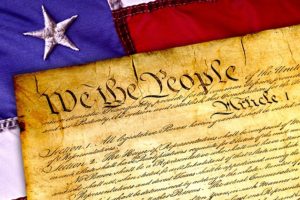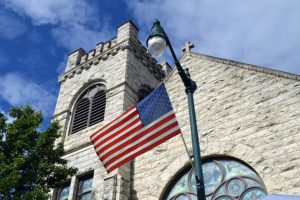
As a writer, I’ve always wondered what it was like to pen something as significant and monumental as the Declaration of Independence. Did Thomas Jefferson welcome the challenge? Did sentences form in his head faster than he could dip quill to ink pot? Or did he sit and ponder, staring at blank parchment as he considered the magnitude of what he was about to write.
Thomas Jefferson’s mother’s family was among one of the most prominent in Virginia. He studied at the College of William and Mary in Williamsburg prior to beginning the practice of law. Jefferson entered the Virginia House of Burgesses just as the rumble of opposition to British taxation was increasing, and in 1774, wrote a pamphlet about the rights of British Americans.
At the second Continental Congress, in June of 1776, Jefferson was appointed to a 5-member committee, along with John Adams, Benjamin Franklin, Robert Livingston, and Roger Sherman. Although an awkward speaker, Jefferson had already distinguished himself as a gifted writer and was chosen to draft the Declaration of Independence by the other committee members, who read, made suggestions, and agreed to the document before it was presented. Jefferson, however, was the primary author.
While the comparison may seem unlikely, Moses was also a freedom leader. Like Thomas Jefferson, he was a son of privilege, the adopted son of the Egyptian Pharaoh’s daughter. Both Jefferson and Moses had issues with verbal communication, but as is often the case, had strengths in other areas. Slavery is also a common thread: Jefferson owning slaves; Moses leading slaves to freedom.
Here are some things we can learn about leaders and freedom:
All leaders possess strengths and weaknesses
Often we use a different yardstick for leaders than we do for ourselves. We expect all leaders in government, business, or ministry to be perfectly flawless. But everyone has weaknesses. We’re all sinners. We’re all fallible. It’s easy to see, and point out, the shortcomings of others while at the same time wearing blinders to your own areas of weakness.
Moses committed murder. Jefferson was a slave owner. Yet God used these men to further the cause of freedom. God may not have an assignment like penning a document that alters the course of history, but your task may involve leading captives—those living in bondage to sin, shame, and guilt—to freedom by sharing the Good News of the Gospel.
Complainers will always be a plague to freedom
Although the children of Israel were freed from captivity, it didn’t take them long to start complaining about their new situation. They focused on their current circumstances instead of being thankful for their freedom. At one point, they were willing to return to the familiarity of slavery instead of embracing the challenges of their present reality.
Discontent critics still plague us. They don’t like leadership, laws, policies, coworkers, or myriad other things and express their dislike with strident voices or violent acts.
In America, we don’t have to hide to worship. We aren’t required to get permission to travel. And we don’t go to bed at night wondering if secret militia will break down the door and drag us away.
Many people in America don’t recognize the blessings of liberty. Their loud, belligerent voices ring out across social media. Their negativism and hatred tarnish freedom. Instead of engaging them, or following in their footsteps, use your freedom to speak words of kindness, encouragement, and truth.
Personal freedom should never negate the freedoms of others
Voicing opinions without fear of reprisal is a cherished liberty, but I have noticed proponents of personal freedoms often want to limit the freedoms of others. They demand acceptance for their choices while working to silence the voices of others. They criticize leaders and decry constitutional freedoms with which they don’t agree. These whiners do not understand the basic tenets of freedom.

Religious freedom is worth protecting
Our Founding Fathers risked much to secure the freedoms we enjoy today. But increasingly, religious freedom, the very reason many of our Founding Fathers came to this country, is challenged in America. Scoffers malign faith in God, criticize those who pray, and seek to pass laws limiting the right to maintain moral and religious values.
It’s time for people of faith to lead the way, like freedom leaders before us, standing up for the religious liberty our forefathers fought so hard to secure. The greatest liberty one can experience is the freedom to believe and receive salvation through Jesus Christ.
Cherish freedoms and don’t let others rob you of them.
“So if the Son sets you free, you will be free indeed.” (John 8:36 NIV)

©CandyArrington
Candy Arrington is an award-winning writer, blogger, and speaker. She often writes on tough topics with a focus on moving through, and beyond, difficult life circumstances. Candy has written hundreds of articles, stories, and devotions published by numerous outlets including: Inspiration.org, Arisedaily.com, CBN.com, Healthgrades.com, Care.com, Focus on the Family, NextAvenue.org, CountryLiving.com, and Writer’s Digest. Candy’s books include Life on Pause: Learning to Wait Well (Bold Vision Books), When Your Aging Parent Needs Care (Harvest House), and AFTERSHOCK: Help, Hope, and Healing in the Wake of Suicide (B&H Publishing Group).
To receive Candy’s blog, Forward Motion, via email, go to https://candyarrington.com/blog/ and scroll to the bottom of the page to sign up.


2 Comments
Good one, Candy! I enjoy all of your blogs…..I don’t always comment, but I always enjoy all of them…..Love, Baba
Thank you! I always appreciate your feedback. Love, C